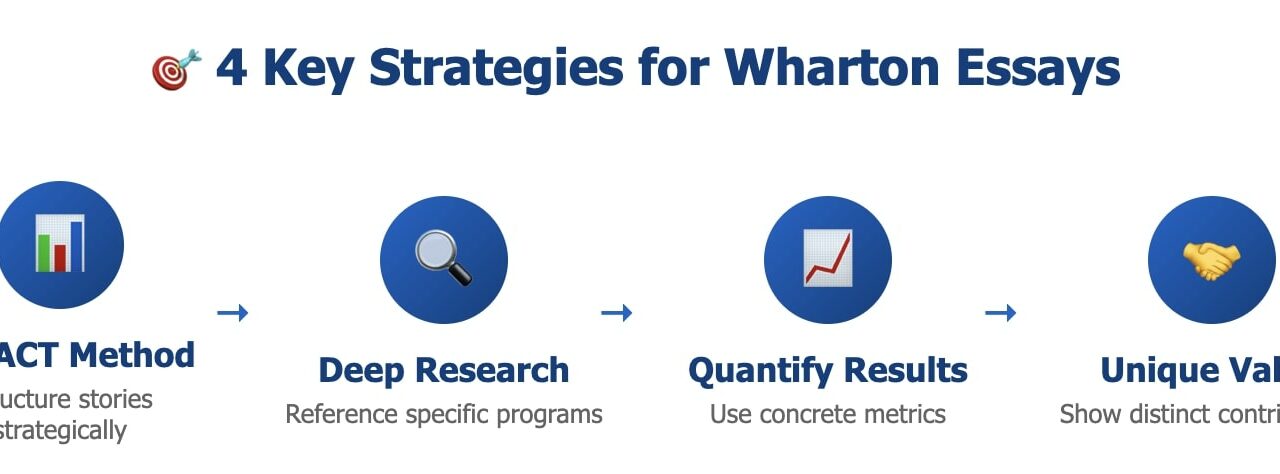If you’re reading this, you’re likely among the thousands of ambitious professionals worldwide who dream of joining Wharton’s elite MBA program. With an acceptance rate hovering around 20%, Wharton remains one of the most selective business schools globally, and your essays will be the deciding factor between acceptance and rejection.

Your Wharton essays aren’t just application requirements—they’re your opportunity to demonstrate why you belong in one of the world’s most prestigious business programs. Unlike other schools that focus primarily on professional achievements, Wharton explicitly seeks candidates who can articulate both their career ambitions and personal qualities that will contribute to the school’s collaborative, data-driven community.
The reality is stark: admissions officers spend mere minutes reviewing each application. Your essays must immediately capture attention, demonstrate clear thinking, and showcase the unique value you’ll bring to Wharton’s diverse cohort of accomplished professionals.
⭐ Key Takeaways for your Wharton Essay:
- Structure stories using the IMPACT method to showcase Wharton’s core values: analytical thinking, global perspective, social impact, and collaborative leadership.
- Research deeply—reference specific Wharton faculty, programs, and clubs that align with your goals, not generic school praise.
- Quantify achievements with concrete metrics to reflect Wharton’s data-driven culture and clearly connect your past experience to future MBA goals.
- Highlight how your unique background will add distinct value to classroom discussions and group projects in Wharton’s collaborative community.
- What Makes Wharton Essays Unique
- Current Essay Landscape and What to Expect
- What Each Prompt Is Really Asking For
- Transforming Your Professional Story Into Compelling Narratives
- Demonstrating Authentic Fit with Wharton’s Culture
- Strategic Career Goal Articulation
- Key Successful Strategies: Three Profile Deep Dives
- Your Action Plan for Essay Success
- Conclusion: Your Path Forward
- Frequently Asked Questions about Wharton MBA Program
⭐BEYOND GREAT ESSAYS: YOUR COMPLETE WHARTON STRATEGY
While essays are crucial, Wharton’s median GMAT score is 730. Strengthen your entire application with our comprehensive free GMAT prep resources—including 15+ hours of video lessons, 400 practice questions, and full-length adaptive mocks.
What Makes Wharton Essays Unique
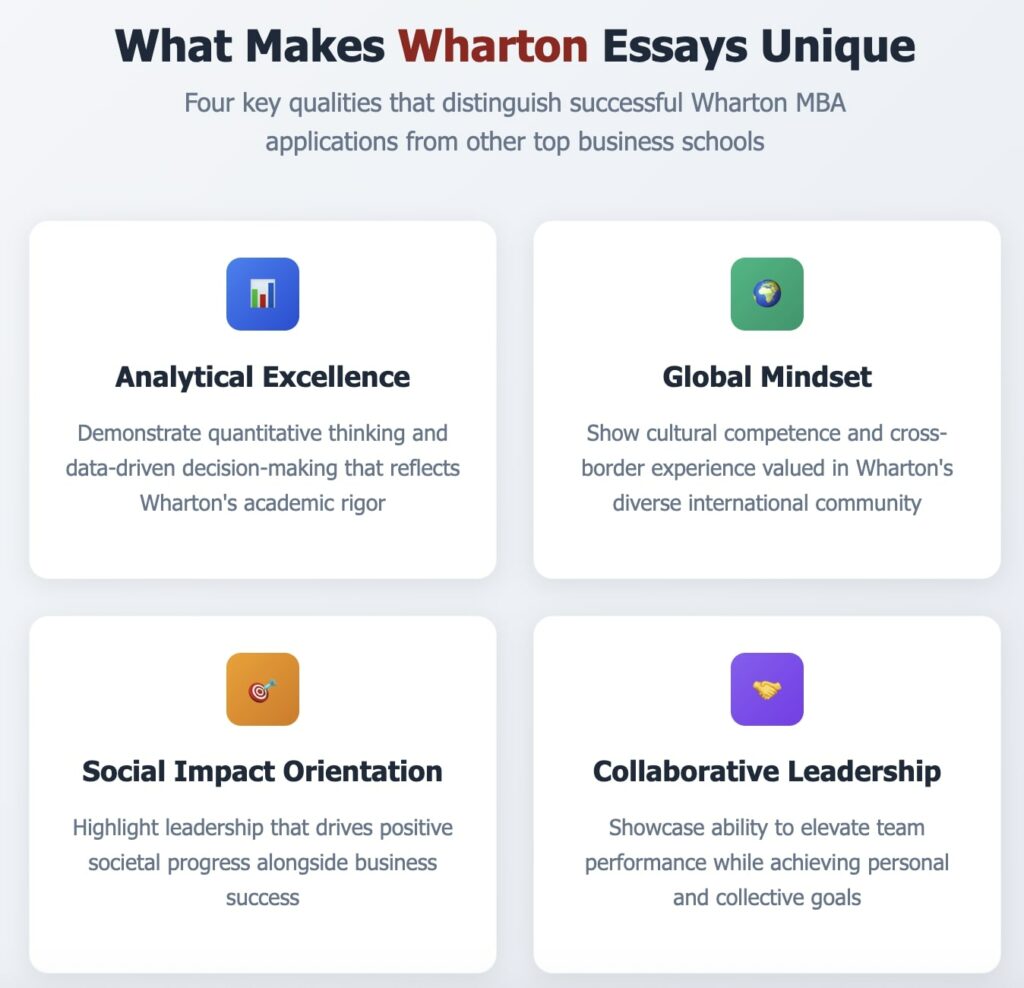
Unlike other top MBA programs that focus primarily on leadership potential or personal growth, Wharton seeks candidates who can demonstrate:
- Analytical Excellence: Your essays should reflect quantitative thinking and data-driven decision-making—hallmarks of Wharton’s academic rigor.
- Global Mindset: With one-third of each class being international, cultural competence and cross-border experience are highly valued.
- Social Impact Orientation: Wharton explicitly seeks leaders who will drive positive societal progress alongside business success.
- Collaborative Leadership: The school values team players who elevate others while achieving personal goals.
⭐MATCH WHARTON’S ANALYTICAL EXCELLENCE
Wharton values “analytical thinking and data-driven decision-making.” Your GMAT score must reflect these same qualities. Take our free SigmaX adaptive mock test to assess where you stand and get detailed performance analytics that mirror the official GMAT experience.
Current Essay Landscape and What to Expect
Essay 1: Career goals and “Why MBA/Why Wharton?” (~500 words)
“How do you plan to use the Wharton MBA program to help you achieve your future professional goals? You might consider your past experience, short and long-term goals, and resources available at Wharton.“
This essay typically asks you to articulate your career trajectory and explain how Wharton’s specific resources will help you achieve your goals. It’s not enough to say you want to advance your career—you need to demonstrate:
- Clear short-term and long-term career objectives
- Specific understanding of Wharton’s curriculum, faculty, and programs
- Logical connection between your past experiences and future aspirations
- How Wharton’s unique offerings align with your professional needs
Essay 2: Community contributions and fit (~400 words)
“Taking into consideration your background – personal, professional, and/or academic – how do you plan to make specific, meaningful contributions to the Wharton community?“
This prompt focuses on what you’ll bring to Wharton’s community. Admissions officers want to understand:
- Your values and background
- Specific ways you’ll contribute to campus life
- Examples of leadership and collaboration from your experience
- How your perspective will enrich classroom discussions and group projects
Optional Essay: Address application gaps or provide additional context
“Please use this space to share any additional information about yourself that cannot be found elsewhere in your application and that you would like to share with the Admissions Committee.”
| When to Use It | Strategic Approach |
| ⚠️ Explain career gaps or pivots | ✅ Acknowledge briefly (don’t over-explain) |
| ❗ Address academic concerns (low GPA, missing prerequisites) | ℹ️ Provide context (circumstances, lessons learned) |
| ❓ Provide context for personal circumstances | ↗️ Demonstrate growth (how you’ve addressed the issue) |
| ➕ Highlight additional accomplishments that don’t fit elsewhere | ⭐ Pivot to strength (what this experience taught you) |
What Each Prompt Is Really Asking For
| Essay | Focus | What You Need to Demonstrate |
| ➡️ Essay 1 – Career Vision and Wharton Fit | This essay typically asks you to articulate your career trajectory and explain how Wharton’s specific resources will help you achieve your goals. | ⭐ Clear short-term and long-term career objectives ℹ️ Specific understanding of Wharton’s curriculum, faculty, and programs ⚙️ Logical connection between your past experiences and future aspirations ✅ How Wharton’s unique offerings align with your professional needs |
| ✅ Essay 2 – Community Impact and Contributions | This prompt focuses on what you’ll bring to Wharton’s community. | ⭐ Your values and background ➕ Specific ways you’ll contribute to campus life ↗️ Examples of leadership and collaboration from your experience ⚡ How your perspective will enrich classroom discussions and group projects |
Common Misinterpretations to Avoid
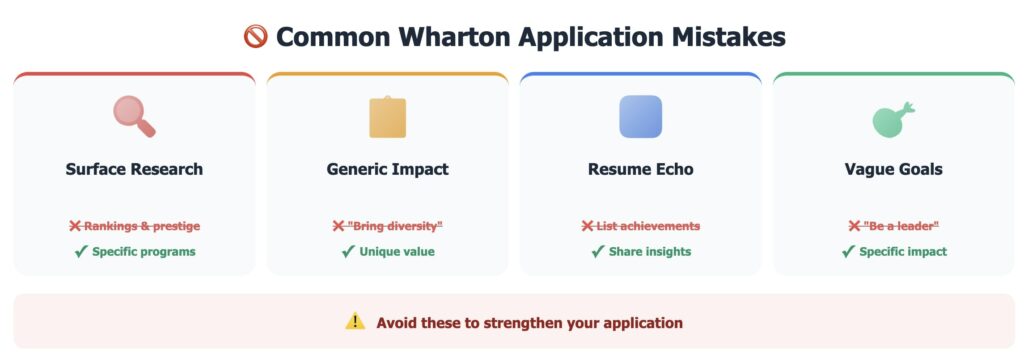
Many applicants stumble on these critical mistakes:
- Superficial research: Don’t just list Wharton’s rankings or general prestige. Demonstrate deep knowledge of specific programs, professors, or initiatives.
- Generic contributions: Avoid vague statements like “I’ll bring diversity to the classroom.” Instead, specify how your unique background will enhance particular aspects of the Wharton experience.
- Resume repetition: Don’t simply restate your accomplishments. Focus on insights, growth, and lessons learned.
- Weak goal articulation: Saying “I want to be a leader” isn’t enough. Define specific roles, industries, and impact you want to create.
⚠️AVOID GMAT PREPARATION MISTAKES TOO
Just as essay mistakes can derail your Wharton dreams, poor GMAT prep wastes precious time. Our free Personalized Study Plan creates your optimal path from current score to Wharton’s 730+ median—saving you months of inefficient studying.
Transforming Your Professional Story Into Compelling Narratives
The Wharton Storytelling Framework

Many applicants struggle with translating professional achievements into compelling personal narratives. Here’s a proven framework:
The IMPACT Method:
- Issue: What challenge or opportunity did you identify?
- Method: What analytical approach did you take?
- Process: How did you execute your solution?
- Action: What specific steps did you take?
- Consequence: What quantifiable results did you achieve?
- Transfer: How does this experience inform your MBA goals?
Story Selection Strategy
Choose experiences that demonstrate:
- Analytical Problem-Solving: Show how you used data or frameworks to make decisions
- Leadership Through Influence: Examples of leading without formal authority
- Global or Cross-Cultural Impact: Experiences working across diverse environments
- Values-Driven Decision Making: Times when you balanced profit with purpose
Demonstrating Authentic Fit with Wharton’s Culture
Deep Research Strategy
Generic applications are easily spotted. Demonstrate genuine fit by referencing:
- Specific Faculty: Mention professors whose research aligns with your interests
- Unique Programs: Reference specialized tracks like Health Care Management or Social Impact
- Student Organizations: Identify 2-3 clubs where you’ll actively contribute
- Global Opportunities: Discuss specific international programs or exchange partnerships
Values Alignment Framework
Connect your experiences to Wharton’s core values:
- Data-Driven Leadership: Share examples of using analytics to drive decisions
- Collaborative Excellence: Describe times you succeeded by elevating team performance
- Global Perspective: Highlight cross-cultural experiences or international awareness
- Social Responsibility: Show how you’ve balanced business success with societal impact
Strategic Career Goal Articulation
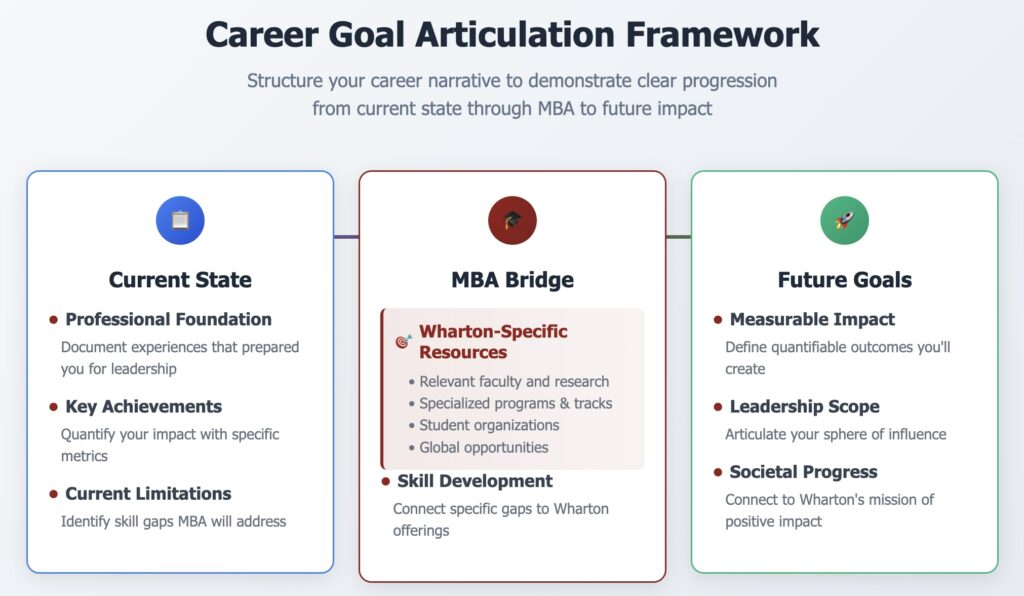
The Bridge Technique
Your career narrative should position your MBA as the essential bridge between your current capabilities and future aspirations:
- Past Foundation: What experiences have prepared you for leadership?
- Present Gap: What specific skills or knowledge do you need to develop?
- Wharton Bridge: How will specific Wharton resources address these gaps?
- Future Impact: What measurable impact will you create post-MBA?
Goal Specificity Framework
Short-term Goals (0-3 years post-MBA):
- Specific role title and function
- Target company type or industry segment
- Geographic market or scope
- Key performance metrics you’ll drive
Long-term Vision (5-10 years):
- Leadership position and scope of responsibility
- Industry or societal problem you’ll address
- Quantifiable impact you aim to create
- How this connects to Wharton’s mission
Key Successful Strategies: Three Profile Deep Dives
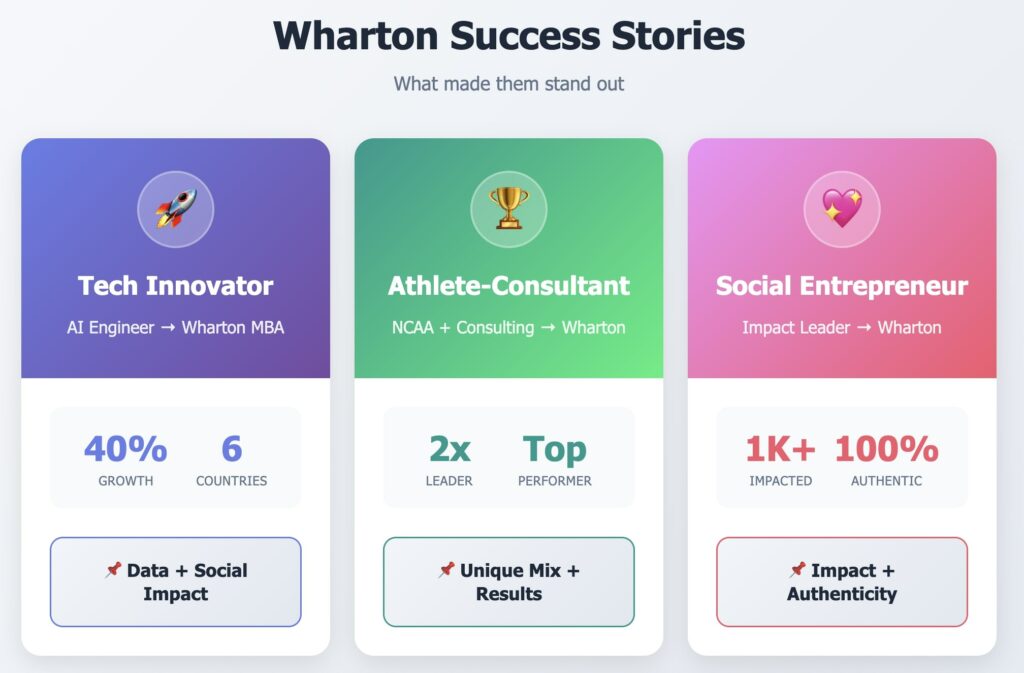
Profile 1: The Tech Innovator
Background: AI software engineer with 5 years launching voice technology across European markets
Winning Strategies:
- Quantified user engagement increases (40%) and market expansion metrics
- Connected AI expertise to Wharton’s analytics curriculum and Innovation Club
- Emphasized cross-cultural team leadership across 6 European countries
- Positioned goal as bridging technology and social impact through education
⭐ Key Takeaway: Used concrete data while avoiding generic “tech leader” positioning
Profile 2: The Athlete-Consultant
Background: Management consultant and former NCAA Division I athlete seeking sports industry transition
Winning Strategies:
- Balanced analytical consulting achievements with unique athletic discipline
- Quantified both team captain results and project outcomes with client impact metrics
- Demonstrated cultural fit through mentorship examples and collaborative leadership
- Showed clear industry transition logic through Sports Business Club involvement
⭐ Key Takeaway: Leveraged unique experience combination while showing deep industry knowledge
Profile 3: The Social Impact Entrepreneur
Background: Social enterprise founder focused on economic mobility with national recognition
Winning Strategies:
- Provided specific impact numbers (people helped, programs scaled)
- Shared authentic vulnerability about overcoming stage fright
- Connected mission directly to Wharton’s societal progress commitment
- Explained how global alumni network would enable international scaling
⭐ Key Takeaway: Balanced impressive achievements with genuine personal growth narrative
Your Action Plan for Essay Success
Phase 1: Foundation Building (3-4 months before deadline)
- Complete deep Wharton research using specific resources guide
- Inventory experiences using IMPACT method
- Conduct informational interviews with current students/alumni
- Draft initial career goals using bridge technique
Phase 2: Story Development (2-3 months before deadline)
- Select 3-4 core stories that demonstrate different competencies
- Apply values alignment framework to each experience
- Create detailed outlines for each expected essay prompt
- Seek feedback from mentors or admissions consultants
Phase 3: Refinement (1-2 months before deadline)
- Write complete first drafts focusing on authentic voice
- Quantify all claims with specific metrics and data
- Ensure complementary coverage across all essays
- Conduct final research verification for all Wharton references
✅CREATE YOUR GMAT TIMELINE ALONGSIDE ESSAY PREP
Since you’re building your application timeline, include GMAT preparation in your foundation phase. Our free Personalized Study Plan integrates with your MBA timeline, showing exactly when to study each topic to hit your target score before applications open.
Conclusion: Your Path Forward
The most successful Wharton applicants use the essay process as an opportunity for genuine self-reflection and strategic career planning. Your unique combination of experiences, values, and aspirations has brought you to this point for a reason.
Remember these key success factors:
- Research deeply to demonstrate genuine Wharton knowledge
- Quantify everything to reflect analytical thinking
- Stay authentic while showcasing your best self
- Think community-first about your contributions
Start your journey today by conducting thorough research into the specific programs that align with your goals. Your future as a Wharton MBA awaits—now it’s time to tell your story in a way that opens that door.
⭐EXCELLENCE IN ONE AREA ISN’T ENOUGH FOR WHARTON
Your compelling essays need to be matched by an equally impressive GMAT score. While you’re crafting your narrative, build the quantitative credentials Wharton expects. Access our complete free GMAT prep platform—from personalized study plans to advanced mock tests—and create the well-rounded application that opens doors.
Frequently Asked Questions about Wharton MBA Program
The total cost for the two-year Wharton MBA program is $264,448 for 2025-2026. This breaks down to $132,224 annually, which includes:
Tuition: $87,970
University Fees: $4,670
Living Expenses: $39,584
These comprehensive costs cover all academic requirements and estimated living expenses for the full program duration. For detailed information about financial planning, payment options, and cost breakdowns, visit the tuition and financial aid section.
Yes, Wharton MBA is extremely competitive with an acceptance rate of approximately 14-17%. The program receives 6,000-7,000 applications annually but admits only around 1,000 candidates, with approximately 840-866 students enrolling per class.
While 75-80% of applicants are qualified, only a small fraction gain admission due to the highly selective nature of the program. The competition reflects Wharton’s prestigious reputation and exceptional career outcomes.
For more details about admission requirements and current statistics, check the admissions FAQ.
Yes, the Wharton MBA is a full-time, two-year program requiring four full semesters of residence. Students must complete a maximum of 21 credit units across these four semesters and pay tuition for all semesters before graduation.
This structured approach provides:
Comprehensive business education
Time for summer internships
Opportunity for specialization and major selection
Deep networking and relationship building
The two-year format allows students to fully immerse themselves in the Wharton experience. Learn more about the program structure.
No minimum GMAT score is required to apply to Wharton MBA. The program accepts both GMAT and GRE scores, with competitive scores expected but no stated minimum requirement.
Key details include:
Both GMAT and GRE equally accepted
GMAT Focus Edition now accepted
Scores valid for 5 years
Self-reporting allowed in applications
For reference, the Executive MBA program has an average GMAT score of 716, indicating the competitive nature of Wharton programs. This flexibility allows applicants to choose their preferred test format.
Wharton is famous for being the world’s first collegiate business school, founded in 1881, and its excellence in quantitative analysis and finance. As a pioneer in business education globally, it offers:
Rigorous quantitative and analytical focus
19 MBA majors with curriculum flexibility
100,000+ strong global alumni network
20+ research centers
Top specializations in Finance, Consulting, Technology, Marketing, and Entrepreneurship
This combination of historical significance, academic rigor, and extensive network makes Wharton a leading destination for business education. Explore more about the program overview.
Wharton MBA graduates achieve exceptional career outcomes with a $175,000 median starting salary and 98%+ employment rate. Over 650 companies make offers annually, demonstrating strong industry connections.
Employment highlights include:
Top industries: Financial Services (36.7%), Technology (17.2%), Consulting (14.3%)
91%+ of graduates work in the United States
52.5% successfully change both industry and function
Extensive career flexibility and advancement opportunities
These statistics reflect Wharton’s strong reputation and comprehensive career support services. For detailed career statistics and outcomes, visit the career management section.
Approximately 1,732 total MBA students are enrolled at Wharton across both years of the program. The breakdown includes:
Typical incoming class: 840-866 students
Class of 2026: 866 students
Total enrollment: ~1,732 (two classes combined)
This size allows for diverse perspectives and extensive networking opportunities while maintaining close-knit community dynamics. The substantial class size ensures varied backgrounds, experiences, and career goals among students.
For current class demographics, backgrounds, and detailed profiles, check the class profile page.
Yes, Wharton offers extensive scholarships and financial aid, with one-third (33%) of students receiving fellowship awards. Available options include:
Merit-based awards:
Wharton Fellowships with automatic consideration for all admits
Specialized fellowships like Prism (full tuition) and ROMBA ($20,000+)
Additional support:
Need-based aid through Wharton Student Experience Fund
Veterans’ Yellow Ribbon Program up to $23,000
Federal Direct, Grad PLUS, and private loan options
This comprehensive financial aid structure makes the program accessible to diverse candidates. Learn more about financing and fellowships.
No, Wharton has no preference between GMAT and GRE. The school explicitly states: “There is no minimum GMAT or GRE score requirement to apply to the Wharton MBA program, and we don’t have a preference for one test over another.”
Key policies include:
Both tests equally accepted
GMAT Focus Edition now accepted
Scores valid for 5 years
Self-reporting allowed in applications
This flexibility allows applicants to choose their preferred test format based on their strengths and preparation preferences, ensuring equal consideration regardless of test choice.
The general Wharton MBA acceptance rate is approximately 14-17%. While the specific Class of 2025 rate isn’t explicitly stated, this range is based on consistent historical data showing:
6,000-7,000 annual applications
Approximately 1,000 candidates admitted
Around 840 students enrolled
Relatively consistent acceptance rates over recent years
The highly selective nature reflects Wharton’s prestigious reputation and competitive applicant pool. For the most current admission statistics and trends, visit the admissions FAQ page.


